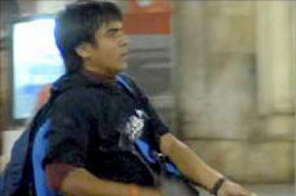Mumbai gunman pleads guilty
MUMBAI: The sole surviving gunman from the Mumbai attacks, a Pakistani national, pleaded guilty at his trial on Monday, admitting his part in the atrocity for the first time.
Mohammed Ajmal Kasab, 21, told a special prison court, where he had originally pleaded not guilty, that he wanted to confess.
He then narrated how the attacks were carried out and gave details of the attackers' journey from Pakistan.
Kasab's lawyer, Abbas Kazmi, was unaware that his client was going to take such action, TV news channels reported. The day's proceedings had been due to hear eye-witness evidence from a police officer who witnessed the shootings.
Prosecutor Ujjwal Nikam told reporters outside court that Kasab had "stood up and informed the court that he was willing to confess".
The lawyer, who admitted being surprised, said Kasab had realised "the cat was out of the bag" after 134 witnesses gave evidence against him since the trial began in April.
DNA and fingerprint evidence was also produced in court.
A total of 166 people died and more than 300 others were injured when 10 heavily-armed gunmen attacked sites across south Mumbai, including luxury hotels, the city's main railway station, a restaurant and a Jewish centre.
Kasab and an accomplice opened fire with AK-47 assault rifles and threw hand grenades at commuters at the Chhatrapati Shivaji Terminus, killing 52 and injuring 109 in the bloodiest episode of the 60-hour reign of terror.
The pair, who were seen on CCTV cameras and captured by news photographers, then fled the station, firing indiscriminately on the way, killing civilians and a number of senior police officers.
Among the dead was the head of the city's Anti-Terrorism Squad, Hemant Karkare.
Kasab, who also placed an eight-kilogramme (18-pound) bomb in a taxi that took him to CST station and later exploded near Mumbai's airport, killing the driver and a passenger, was the only one of the 10 gunmen to survive.
All are said to have been trained, equipped and financed by the banned, Pakistan-based Islamist group Lashkar-e-Taiba (LeT).
"I believe that the entire conspiracy was hatched by these Pakistani nationals and it was only a formality," Ashok Chavan, the chief minister of Maharashtra state, of which Mumbai is the capital, told the NDTV news channel.
"All those involved in the 26/11 (November 26) attacks should be hanged."
Before the trial, Kasab's lawyer told AFP in an interview that he faced an "nearly impossible task" to defend his client because of the number of witnesses.
But he indicated that his defence could hinge on whether Kasab was responsible for his actions, suggesting that he may have been brainwashed into carrying out the attacks.
The trial was initially delayed after Kasab claimed to be under 18 at the time, raising the prospect that he could be tried by the juvenile court, which can only impose a maximum three-year jail term.
Medical tests, though, established he was over 18. As a result, the court can impose the maximum sentence -- death.
The chargesheet against Kasab, the nine dead gunmen and 35 other LeT "terrorists" sought in connection with the attacks accused them of carrying out a "heinous criminal conspiracy".
"This was with the express intention to destabilise India, wage war against the country, terrorise its citizens, create financial loss and issue a warning to other countries," it added.
Two other men are also on trial -- Indian nationals Fahim Ansari, 35, and Sabauddin Ahmed, 24, who are said to have provided the group with invaluable logistical support before the attacks.






